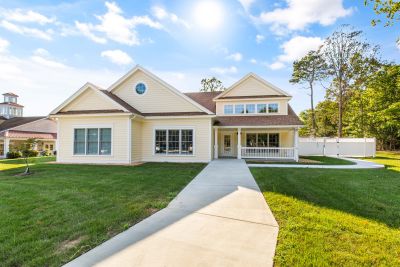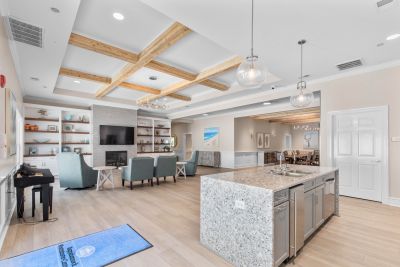As our loved ones age, ensuring they receive the care they need to enjoy a high quality of life becomes a top priority. For those experiencing cognitive decline and memory loss, the journey can be particularly challenging. Memory care offers a specialized environment designed to meet the unique needs of seniors with dementia and other memory-related conditions. Understanding when and why memory care might be necessary can help families make informed decisions that enhance their loved ones’ quality of life.
What Is Dementia?
Dementia is an umbrella term for a variety of conditions and brain disorders whose symptoms are marked by a decline in brain function — including but not limited to memory loss — that is severe enough to interfere with daily life. There are many types of dementia; Alzheimer’s disease is the most common, accounting for 60-80% of cases.
Symptoms of dementia can include:
- Memory loss
- Difficulty communicating or finding the right words
- Problems with visual and spatial abilities
- Difficulty performing complex tasks, including planning and organizing
- Impaired reasoning, problem-solving, or judgment
- Confusion or disorientation
- Changes in mood and behavior
- Poor physical coordination
These symptoms can vary significantly depending on the type of dementia and the individual, but they generally worsen over time, leading to increasing dependency on others for appropriate care. In a senior living environment, this is known as memory care.
What Is Memory Care?
 Memory care is a type of long-term care specifically tailored for individuals with Alzheimer’s disease, dementia, and other cognitive impairments. Because these prevent seniors from safely or effectively performing activities of daily living (ADLs), dementia patients require assisted living with memory care.
Memory care is a type of long-term care specifically tailored for individuals with Alzheimer’s disease, dementia, and other cognitive impairments. Because these prevent seniors from safely or effectively performing activities of daily living (ADLs), dementia patients require assisted living with memory care.
Unlike traditional assisted living, which is designed to offer support with ADLs for seniors who have physical limitations, memory care living provides an extra layer of 24/7 protection and other considerations. It focuses on creating a safe, structured environment that minimizes stress and anxiety for residents and their families.
In addition to personal care and assistance with ADLs, key features of memory care include:
- Secured environments to prevent wandering
- Specialized staff trained in dementia care
- Personalized care plans
- Therapeutic activities designed to improve cognitive function
- Enhanced safety measures
These elements work together to provide a comfortable environment and attentive care that address the specific challenges faced by individuals with memory loss.
Signs It’s Time for Memory Care
Recognizing when a loved one needs memory care can be challenging. Some signs that it might be time to consider this option include:
- Increased forgetfulness. Watch for frequent memory lapses that disrupt daily life, such as forgetting important dates or repeatedly asking for the same information.
- Difficulty with daily activities. Note if your loved one is struggling with routine tasks like cooking, cleaning, or personal hygiene.
- If your older family member has a tendency to wander or get lost, this can pose significant safety risks.
- Behavioral changes. Document unusual changes in mood or behavior, such as increased agitation, aggression, or withdrawal from social activities.
- Decline in physical health. Look for signs of unexplained weight loss, poor nutrition, or neglect of personal health.
- Safety concerns. You may begin to notice increased instances of falls, mishandling medications, or leaving appliances on (that should be turned off after use, such as TVs, irons, ovens, and stoves).
If any of these signs are present, it may be time to explore memory care options to ensure the safety and well-being of your loved one.
How Memory Care Benefits Seniors
 Memory care offers numerous advantages, ensuring that seniors with dementia receive the specialized support they need for the highest possible quality of life. Although family members might be tempted to care for senior loved ones themselves, this can quickly become overwhelming, as dementia patients require around-the-clock care from professional caregivers with expertise in their specific medical and cognitive needs.
Memory care offers numerous advantages, ensuring that seniors with dementia receive the specialized support they need for the highest possible quality of life. Although family members might be tempted to care for senior loved ones themselves, this can quickly become overwhelming, as dementia patients require around-the-clock care from professional caregivers with expertise in their specific medical and cognitive needs.
Enrolling your family member in memory care removes an enormous burden from you while also providing them with these key benefits:
- Safety and security. Memory care facilities are designed to prevent wandering and provide a secure environment, reducing the risk of accidents and injuries while also offering access to emergency or medical care as needed.
- Specialized staff. Caregivers in memory care facilities are trained to understand the unique needs of individuals with memory impairments, offering compassionate and informed care.
- Structured environment. Routine and structure are crucial for individuals with dementia because they help to reduce confusion and anxiety. Memory care programs are designed to create a predictable daily schedule.
- Therapeutic activities. Engaging activities that stimulate cognitive function and enhance social interaction are a core component of memory care. These activities can include art therapy, music therapy, and memory games.
- Personalized care plans. Each resident receives a care plan tailored to their specific needs and abilities, ensuring that they receive the appropriate level of support.
- Emotional support. Memory care facilities also offer emotional support for residents and their families, helping them navigate the challenges of dementia with guidance and understanding.
By addressing the physical, emotional, and cognitive needs of residents, memory care facilities and services provide a holistic approach to dementia care, allowing seniors to live with dignity and as much independence as possible.
Memory care is a vital resource for families navigating the complexities of dementia in their senior loved ones. Understanding what memory care entails, recognizing the signs that it’s needed, and appreciating the benefits it offers can help ensure that seniors receive the compassionate, specialized care they deserve.
Give Your Senior Loved One Top-Notch Memory Care With RWC
Rappahannock Westminster-Canterbury is a continuing care community providing the highest quality living experience for discerning senior adults. Situated on 165 beautiful acres outside the village of Irvington in Virginia’s Northern Neck, RWC residents choose to live here for the independent and worry-free lifestyle afforded in a tranquil setting as well as a wide variety of wellness resources. In addition to supporting the general cognitive and emotional health of all residents, RWC also offers an excellent Memory Care Program.
Our Memory Care Program is committed to maintaining the dignity of every individual with memory loss. We strive for the highest quality of care to promote residents’ best quality of life. Our latest in continuum-of-care offerings is the Birdsong House, a residential home for residents who are experiencing mild to moderate cognitive impairment or memory challenges.
The Birdsong House is a residentially styled, specially equipped home with eight private suites. Each features a sleeping area, living space, and full private bathroom with shower. Residents can enjoy the large, bright activity room, full kitchen, home-like dining area, and safe outdoor space. We offer engaging programming developed by the residents as well as a specially trained and dedicated team of employees.
Contact us today for lunch and a tour of our beautiful campus. Alternatively, request a brochure to learn more about helping your loved one live their best life at RWC!
